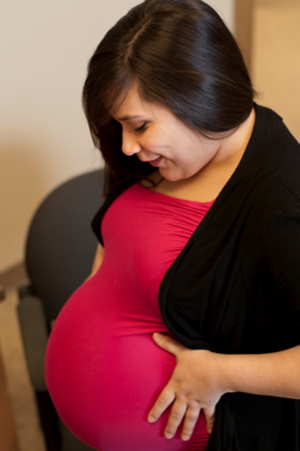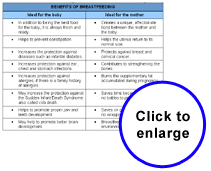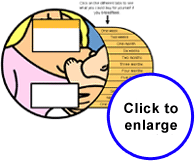MODULE 4
Choosing to Breastfeed
c. Risks of Not Breastfeeding
The benefits of breastfeeding for both the mother and the child are being recognized more and more. Have you ever thought about the risks to you and your baby’s health associated with not breastfeeding? The following list will help you to discover the most common risks mentioned in the literature. Food for thought...
- Increased risk of allergy and asthma
- Reduced cognitive development
- Increased risk of acute respiratory disease
- Increased risk for infection from contaminated formula
- Increased risk of childhood cancers
- Increased risk of obesity and diabetes
- Increased risk of cardiovascular disease
- Increased risk of gastrointestinal and ear infections
- Increased risk of Sudden Infant Death Syndrome*
- Increased risk of breast, ovarian and endometrial cancer for mothers
- Increased risk of osteoporosis and rheumatoid arthritis for mothers
- Increased risk of maternal diabetes
Reference:
INFACT Canada. 14 Risks of Formula Feeding. Retrieved from: http://www.infactcanada.ca/pdf/14-Risks-Small.pdf
INFACT Canada. 2006. Risks of Formula Feeding. Retrieved from: http://www.infactcanada.ca/RisksofFormulaFeeding.pdf
b. Concerns and Myths Surrounding Breastfeeding
New parents have many questions about breastfeeding. Will I be able to breastfeed? Will I have enough milk? Will my partner feel left out?

a. Benefits of Breastfeeding
A. BREASTFEEDING - NOTHING COMPARES!
Being successful and happy with breastfeeding depends on the confidence you have in your capacity to breastfeed. Even though breastfeeding is "natural", learning to breastfeed is a step by step process for both mom and baby, and can be challenging. The first six weeks are when most learning takes place. Breastfeeding becomes easier with time.

INTRODUCTION
You are pregnant! This is the ideal time to decide how you want to feed your baby. Because milk will be the main source of food for your baby during the first year, it is important that you are well-informed before deciding on the method you will use.
Breast milk is made especially for your baby. It contains all the necessary ingredients for the growth and development of your newborn. It is convenient, at the right temperature and takes no preparation. It is impossible to reproduce or imitate your breastmilk.

Your family and friends may give you a great deal of advice about breastfeeding. They will share their good or bad personal experiences. Not everyone believes that breastfeeding is the best thing to do. You may have mixed feelings. What should I do? Inquire about the facts and decide what is best for you and your baby.




